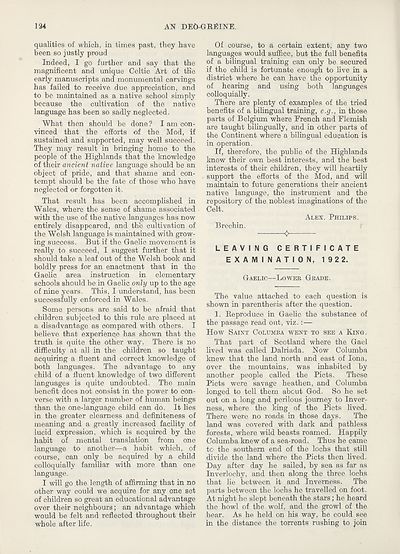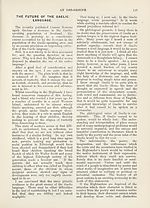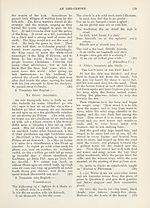An Comunn Gàidhealach Publications > Deo-gréine > Volume 17, October 1921 to September 1922
(132) Page 124
Download files
Complete book:
Individual page:
Thumbnail gallery: Grid view | List view

134
AN DEO-GREINE.
qualities of which, in times past, they have
been so justly proud
Indeed, I go further and say that the
magnificent and unique Celtic Art of the
early manuscripts and monumental carvings
has failed to receive due appreciation, and
to be maintained as a native school simply
because the cultivation of the native
language has been so sadly neglected.
What then should be done ? I am con¬
vinced that the efforts of the Mod, if
sustained and supported, may well succeed.
They may result in bringing home to the
people of the Highlands that the knowledge
of their ancient native language should be an
object of pride, and that shame and con¬
tempt should be the fate of those who have
neglected or forgotten it.
That result has been accomplished in
Wales, where the sense of shame associated
with the use of the native languages has now
entirely disappeared, and the cultivation of
the Welsh language is maintained with grow¬
ing success. But if the Gaelic movement is
really to succeed, I suggest further that it
should take a leaf out of the Welsh book and
boldly press for an enactment that in the
Gaelic area instruction in elementary
schools should be in Gaelic only up to the age
of nine years. This, I understand, has been
successfully enforced in Wales.
Some persons are said to be afraid that
children subjected to this rule are placed at
a disadvantage as compared with others. I
believe that experience has shown that the
truth is quite the other way. There is no
difficulty at all in the children so taught
acquiring a fluent and correct knowledge of
both languages. The advantage to any
child of a fluent knowledge of two different
languages is quite undoubted. The main
benefit does not consist in the power to con¬
verse with a larger number of human beings
than the one-language child can do. It lies
in the greater clearness and definiteness of
meaning and a greatly increased facility of
lucid expression, which is acquired by the
habit of mental translation from one
language to another—a habit which, of
course, can only be acquired by a child
colloquially familiar with more than one
language.
I will go the length of affirming that in no
other way could we acquire for any one set
of children so great an educational advantage
over their neighbours; an advantage which
would be felt and reflected throughout their
whole after life.
Of course, to a certain extent, any two
languages would suffice, but the full benefits
of a bilingual training can only be secured
if the child is fortunate enough to live in a
district where he can have the opportunity
of hearing and using both languages
colloquially.
There are plenty of examples of the tried
benefits of a bilingual training, e.g., in those
parts of Belgium where French and Flemish
are taught bilingually, and in other parts of
the Continent where a bilingual education is
in operation.
If, therefore, the public of the Highlands
know their own best interests, and the best
interests of their children, they will heartily
support the efforts of the Mod, and will
maintain to future generations their ancient
native language, the instrument and the
repository of the noblest imaginations of the
Celt.
Alex. Philips.
Brechin.
$
LEAVING CERTIFICATE
EXAMINATION, 192 2.
Gaelic—Lower Grade.
The value attached to each question is
shown in parenthesis after the question.
1. Reproduce in Gaelic the substance of
the passage read out, viz.: —
How Saint Columba went to see a King.
That part of Scotland where the Gael
lived was called Dalriada. Now Columba
knew that the land north and east of Iona,
over the mountains, was inhabited by
another people called the Piets. These
Piets were savage heathen, and Columba
longed to tell them about God. So he set
out on a long and perilous journey to Inver¬
ness, where the king of the Piets lived.
There were no roads in those days. The
land was covered with dark and pathless
forests, where wild beasts roamed. Happily
Columba knew of a sea-road. Thus he came
to the southern end of the lochs that still
divide the land where the Piets then lived.
Day after day he sailed, by sea as far as
Inverlochy, and then along the three lochs
that lie between it and Inverness. The
parts between the lochs he travelled on foot.
At night he slept beneath the stars; he heard
the howl of the wolf, and the growl of the
bear. As he held on his way, he could see
in the distance the torrents rushing to join
AN DEO-GREINE.
qualities of which, in times past, they have
been so justly proud
Indeed, I go further and say that the
magnificent and unique Celtic Art of the
early manuscripts and monumental carvings
has failed to receive due appreciation, and
to be maintained as a native school simply
because the cultivation of the native
language has been so sadly neglected.
What then should be done ? I am con¬
vinced that the efforts of the Mod, if
sustained and supported, may well succeed.
They may result in bringing home to the
people of the Highlands that the knowledge
of their ancient native language should be an
object of pride, and that shame and con¬
tempt should be the fate of those who have
neglected or forgotten it.
That result has been accomplished in
Wales, where the sense of shame associated
with the use of the native languages has now
entirely disappeared, and the cultivation of
the Welsh language is maintained with grow¬
ing success. But if the Gaelic movement is
really to succeed, I suggest further that it
should take a leaf out of the Welsh book and
boldly press for an enactment that in the
Gaelic area instruction in elementary
schools should be in Gaelic only up to the age
of nine years. This, I understand, has been
successfully enforced in Wales.
Some persons are said to be afraid that
children subjected to this rule are placed at
a disadvantage as compared with others. I
believe that experience has shown that the
truth is quite the other way. There is no
difficulty at all in the children so taught
acquiring a fluent and correct knowledge of
both languages. The advantage to any
child of a fluent knowledge of two different
languages is quite undoubted. The main
benefit does not consist in the power to con¬
verse with a larger number of human beings
than the one-language child can do. It lies
in the greater clearness and definiteness of
meaning and a greatly increased facility of
lucid expression, which is acquired by the
habit of mental translation from one
language to another—a habit which, of
course, can only be acquired by a child
colloquially familiar with more than one
language.
I will go the length of affirming that in no
other way could we acquire for any one set
of children so great an educational advantage
over their neighbours; an advantage which
would be felt and reflected throughout their
whole after life.
Of course, to a certain extent, any two
languages would suffice, but the full benefits
of a bilingual training can only be secured
if the child is fortunate enough to live in a
district where he can have the opportunity
of hearing and using both languages
colloquially.
There are plenty of examples of the tried
benefits of a bilingual training, e.g., in those
parts of Belgium where French and Flemish
are taught bilingually, and in other parts of
the Continent where a bilingual education is
in operation.
If, therefore, the public of the Highlands
know their own best interests, and the best
interests of their children, they will heartily
support the efforts of the Mod, and will
maintain to future generations their ancient
native language, the instrument and the
repository of the noblest imaginations of the
Celt.
Alex. Philips.
Brechin.
$
LEAVING CERTIFICATE
EXAMINATION, 192 2.
Gaelic—Lower Grade.
The value attached to each question is
shown in parenthesis after the question.
1. Reproduce in Gaelic the substance of
the passage read out, viz.: —
How Saint Columba went to see a King.
That part of Scotland where the Gael
lived was called Dalriada. Now Columba
knew that the land north and east of Iona,
over the mountains, was inhabited by
another people called the Piets. These
Piets were savage heathen, and Columba
longed to tell them about God. So he set
out on a long and perilous journey to Inver¬
ness, where the king of the Piets lived.
There were no roads in those days. The
land was covered with dark and pathless
forests, where wild beasts roamed. Happily
Columba knew of a sea-road. Thus he came
to the southern end of the lochs that still
divide the land where the Piets then lived.
Day after day he sailed, by sea as far as
Inverlochy, and then along the three lochs
that lie between it and Inverness. The
parts between the lochs he travelled on foot.
At night he slept beneath the stars; he heard
the howl of the wolf, and the growl of the
bear. As he held on his way, he could see
in the distance the torrents rushing to join
Set display mode to:
![]() Universal Viewer |
Universal Viewer | ![]() Mirador |
Large image | Transcription
Mirador |
Large image | Transcription
| An Comunn Gàidhealach > An Comunn Gàidhealach Publications > Deo-gréine > Volume 17, October 1921 to September 1922 > (132) Page 124 |
|---|
| Permanent URL | https://digital.nls.uk/127171557 |
|---|
| Description | Leabhar 17, Treasamh Mios an Fhoghair 1921 gu Dara Mìos an Fhoghair 1922 |
|---|---|
| Attribution and copyright: |
|
| Description | This contains items published by An Comunn, which are not specifically Mòd-related. It includes journals, annual reports and corporate documents, policy statements, educational resources and published plays and literature. It is arranged alphabetically by title. |
|---|
| Description | A collection of over 400 items published by An Comunn Gàidhealach, the organisation which promotes Gaelic language and culture and organises the Royal National Mòd. Dating from 1891 up to the present day, the collection includes journals and newspapers, annual reports, educational materials, national Mòd programmes, published Mòd literature and music. |
|---|---|
| Additional NLS resources: |
|

